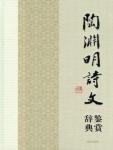Chapter 1 foreword
Tao Yuanming (365 or 372 or 376-427) is the most famous pastoral poet in ancient China.People from the Eastern Jin Dynasty.A Qian, with a bright character, private posthumous posthumous Jingjie.A native of Xunyang Chaisang (now Jiujiang, Jiangxi). Both "Book of Jin" and "Book of Song" claim that he is the great-grandson of Tao Kan, but later generations doubt his theory.Zu Mao was the prefect of Wuchang.Father Yi, once served as the prefect of Ancheng.In the eighteenth year of Taiyuan (393), Tao Yuanming served as Jiangzhou Jijiu. In the third year of Yuanxing (404), he joined the army as General Liu Yuzhi of the Zhenjun Army, and then joined the army as General Jianwei Jiangzhou Governor Liu Jingxuan.In the first year of Yixi (405), he served as the magistrate of Pengze County for 81 days. Because he was dissatisfied with the darkness of reality, he was unwilling to bend his waist for five buckets of rice, so he abandoned his official position and returned to the field.The imperial court summoned the author Lang, but he said that he was ill.
There are more than 120 poems, essays and fus in existence today, most of which were written after returning to hermitage.Prose is the most famous one, which imagines an ideal kingdom free from exploitation and oppression. "Mr. Wuliu's Biography" is an autobiographical work. "Gui Qu Lai Xi Ci" narrates the reasons for returning to seclusion and the comfortable feelings after living in seclusion.Fu "Gan Shi Bu Yu Fu" exposes the most current malpractices and is the most powerful.Among the poems, pastoral poems have achieved the highest achievement. The representative works "Five Poems of Returning to the Garden" and "Twenty Poems on Drinking Poems" express hatred of the dark society, love of pastoral life and praise of natural scenery. "Twelve Miscellaneous Poems" expresses positive thoughts of living up to one's prime and encouraging oneself in time. "Ode to Jingke", "Reading the Classics of Mountains and Seas·Jingwei Title Weimu" and other chapters, embodying the embrace, there are many voices of generosity, grief and indignation.His works also reveal the thoughts of being wise, protecting one's life, having fun in time, and the impermanence of life.In art, there are both vigorous and unrestrained and quiet and diluted features, and the latter is the most representative of his artistic style.His poems have real emotions, distant artistic conception and simple language, which can be unique when Xuanyan poems ruled the literary world of Jin Dynasty.Because his person and his writing are out of fashion, he is not valued by the current world.Liu Xie did not comment on it, and Zhong Rong's "Poetry" only listed it as a middle grade.Xiao Tong was the first to pay attention to Tao poetry. He began to compile eight volumes of Tao poetry, and wrote a biography and preface for it.Since the Tang Dynasty, Tao Yuanming and his works have been valued by people and praised by Li Bai and Du Fu.In the Song Dynasty, he was widely admired by literati. Su Shi had more than a hundred poems with Tao, and Shen Deqian in the Qing Dynasty commented on Tao as "the first-class figure in the Six Dynasties" ("Shuo Shi Yu Yu").There are "Tao Yuanming Collection" and "Sou Shen Postscript".This book is one of the Chinese Literature Appreciation Dictionary series of our company.Selected 76 representative works of Tao Yuanming, including 65 poems and 10 essays, and invited contemporary research experts to write appreciation articles for each work.Among them, interpreting words and sentences and inventing wonderful ideas are helpful to understand the profoundness of Tao Yuanming's famous works, so that readers can taste the tripod and better understand the profound influence of Tao Yuanming's ideal personality and literary achievements on later generations of literati and literature.In addition, there is an appendix "Chronology of Tao Yuanming's Life and Literary Creation" at the end of this book for readers' reference.If it is inappropriate, I ask readers to correct me.

